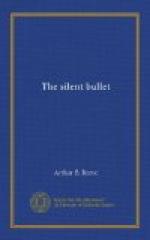“That was three nights ago. On each of the two succeeding nights Henry Vandam says he has been awakened at precisely the same hour by a rapping, and on each night his ‘control’ has given him a message from his dead wife. As a man of science, I attribute the whole thing to an overwrought imagination. The original rappings may have been a mere coincidence with the fact of the condition of Mrs. Vandam. However, I give this to you for what it is worth.”
Craig said nothing, but, as was his habit, shaded his eyes with the tips of his fingers, resting his elbows on the arms of his chair: “I suppose,” he said, “you can give me the necessary authority to enter the Vandam house and look at the scene of these happenings?”
“Certainly,” assented the physician, “but you will find it a queer place. There are spirit paintings and spirit photographs in every room, and Vandam’s own part of the house—well, it’s creepy, that’s all I can say.”
“And also I suppose you have performed an autopsy on the body and will allow me to drop into your laboratory to-morrow morning and satisfy myself on this morphine point?”
“Certainly,” replied the coroner’s physician, “at any time you say.”
“At ten sharp, then, to-morrow I shall be there,” said Craig. “It is now eight-thirty. Do you think I can see Vandam to-night? What time do these rappings occur?”
“Why, yes, you surely will be able to see him to-night. He hasn’t stirred from the house since his wife died. He told me he momentarily expected messages from her direct when she had got strong enough in her new world. I believe they had some kind of a compact to that effect. The rappings come at twelve-thirty.”
“Ah, then I shall have plenty of time to run over to my laboratory before seeing Mr. Vandam and get some apparatus I have in mind. No, Doctor, you needn’t bother to go with me. Just give me a card of introduction. I’ll see you to-morrow at ten. Good-night—oh, by the way, don’t give out any of the facts you have told me.”
“Jameson,” said Craig, when we were walking rapidly over toward the university, “this promises to be an uncommonly difficult case.”
“As I view it now,” I said, “I have suspicions of everybody concerned in it. Even the view of the Star, that it is a case of suicide due to overwrought nerves, may explain it.”
“It might even be a natural death,” Craig added. “And that would make it a greater mystery than ever—a case for psychical research. One thing that I am going to do to-night will tell me much, however.”
At the laboratory he unlocked a glass case and took out a little instrument which looked like two horizontal pendulums suspended by fine wires. There was a large magnet near each pendulum, and the end of each pendulum bore a needle which touched a circular drum driven by clock-work. Craig fussed with and adjusted the apparatus, while I said nothing, for I had long ago learned that in applying a new apparatus to doing old things Craig was as dumb as an oyster, until his work was crowned with success.




